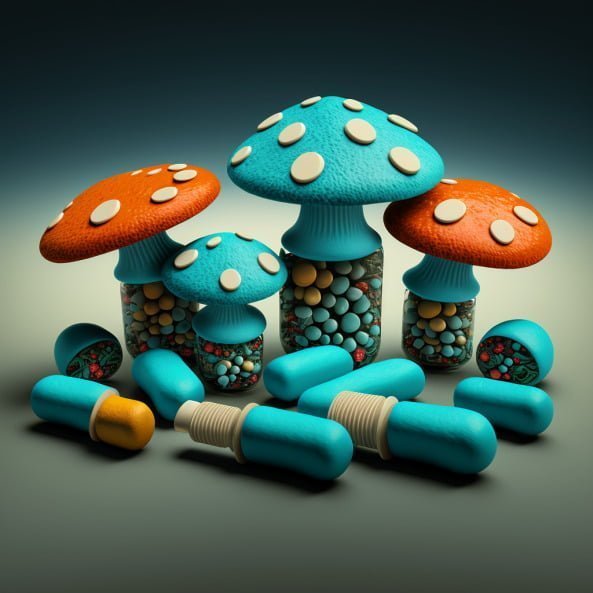

What is the microdosage?
Microdosing refers to the practice of taking small, sub-perceptual doses of a substance, typically a psychedelic drug, with the goal of enhancing productivity, creativity, and overall well-being. The most popular substance used for microdosing is Lysergic acid diethylamide (LSD), but it's also used with other psychedelics like psilocybin (found in magic mushrooms) and methylenedioxymethamphetamine (MDMA).
The concept of microdosing is to take a dosage that is not high enough to produce full-blown psychedelic effects such as hallucinations or intense introspection. The idea is that sub-perceptual doses can have cognitive-enhancing effects that can boost creativity, productivity and overall well-being, increase focus, and reduce anxiety and depression.
However, there is currently a lack of scientific research on the effects and safety of microdosing, and microdosing may not be safe for everyone and not recommended for certain populations especially if they have a history of mental health issues. Also, taking any kind of substance that isn't prescribed by a doctor is not advisable and it may be illegal depending on the country or state.
It's important to note that taking any kind of drug, including psychedelics, has a risk of adverse effects, and it's essential to consult with a healthcare professional before starting any kind of treatment or experimentation.
What say the studies about micro dosage mushrooms?

Microdosing with psilocybin (found in magic mushrooms) is a relatively new phenomenon, and there is currently a lack of scientific research on the effects and safety of microdosing. Some of the studies that have been done have been small, have not been peer-reviewed, and have mainly focused on anecdotal evidence from self-reported experiences. As such, it is not currently possible to make any definitive conclusions about the benefits or risks of microdosing with psilocybin.
What are the positive and negative benefits?
The positive effects of microdosing psilocybin reported by some users include:
- Increased creativity and focus
- Reduced anxiety and depression
- Increased empathy and open-mindedness
- Improved mood and overall well-being
However, it is important to note that these effects have not been extensively studied or confirmed by scientific research. Additionally, individual responses can vary greatly, and some people may not experience any benefits at all.
Potential negative effects of microdosing can include:
- Physical side effects such as headaches, stomach issues, and dizziness
- Anxiety and paranoia
- Mental confusion and decreased focus
- Potentially risky interactions with other medications
- Legal consequences
- Microdosing with psilocybin may also trigger latent mental health conditions such as psychosis or severe depression, or cause a relapse for those in recovery from addiction
Positive results, but research is observational
The new study used a subset of participants from a larger, prior study from the same researchers that was published in November 2021 in Nature-Scientific ReportsTrusted Source
The earlier study found that people who microdosed either psilocybin or LSD reported lower levels of anxiety, depression, and stress than those who did not mircrodose psychedelics.
What's more, a smaller 2019 studyTrusted Source
And though the new study is the largest of its kind to date, it's important to note that it's still observational rather than a randomized controlled trial (RCT). As such, researchers were unable to fully account for other factors that might affect the outcomes, such as age, gender, mental health prior to the study, and other types of treatment.
Factors such as these may also affect how people respond individually to psilocybin.
“One thing that varies hugely in these studies is who people are going in. Some people are resilient to depression but have lots of problems with anxiety, and vice versa,” said Hines. “So a microdose may affect somebody with high levels of anxiety very differently than somebody with high levels of depression.”
Source: healthline.com
It is important to remind that taking any kind of substance, including psychedelics, has a risk of adverse effects, and it is essential to consult with a healthcare professional before starting any kind of treatment or experimentation. Also, psilocybin is a Schedule I controlled substance, meaning it is illegal in most countries and most states of the UK and the US, possession and distribution of it can lead to criminal charges. It is important to remember that self-experimentation is not a safe substitute for FDA-approved research and should be treated as such.
What about micro dosage Lions Mane and Reishi mushrooms?


Lion's mane and reishi mushrooms are both types of medicinal mushrooms that have been used for centuries in traditional medicine. They have been shown to have a variety of health benefits, including immune-boosting, anti-inflammatory, and anti-cancer properties.
Microdosing with Lion's Mane and Reishi mushrooms is a less studied topic compared to other psychedelics and the research on the effects and safety of microdosing with these mushrooms specifically is limited.
Some users claim that microdosing with Lion's Mane can provide mental and physical benefits such as:
- Improved cognitive function
- Increased focus and productivity
- Improved mood and overall well-being
- Reduced symptoms of anxiety and depression
- Boosts the immune system
Reishi mushroom is known for its immune-boosting, anti-inflammatory and anti-cancer properties, and some of the benefits that users claim that it can provide include:
- Improved sleep quality
- Reduced stress and anxiety
- Improved mood
- Boosts the immune system
It is important to note that these claims are based on anecdotal evidence and there is no scientific research on the safety and effectiveness of microdosing Lion's Mane and Reishi mushrooms specifically. As always, it's important to speak with a healthcare professional before taking any kind of supplement and if you're on any kind of medication.
Could psychedelics become safer if legalized?
It is anticipated that some psychedelics, such as psilocybin and MDMA (ecstasy) could be fully legalized in the coming years. Policymakers and health experts have proposed that decriminalizing these drugs and regulating their cultivation and production could make them potentially safer by allowing for more monitoring of quality control. Doing so would also provide wider access without requiring individuals to receive a doctor’s prescription or remain under medical supervision when using psychedelics.
Evidence for microdosing of psychedelics is mixed
The evidence for the effectiveness of microdosing psychedelics is conflicting and it is difficult to determine whether or not it is indeed beneficial. While some studies show potential benefits, such as an improvement in mood and mental health, others are unable to replicate the same findings with the same strength of evidence. One notable study using a naturalistic, observational design showed small to medium-sized improvements in these areas, but many other randomized controlled studies have been unable to replicate these results. This suggests that although there are anecdotal stories about its positive impacts, further research is needed before any reliable conclusions can be made.
The varying results of studies looking into microdosing psychedelics could be due to differences in study design and implementation, such as length of the observation period, sample size or participant demographics. Additionally, factors including individual body chemistry or lifestyle may play an instrumental role in individual outcomes which may affect the collective outcome when examining a broader population across multiple studies making it harder to draw definitive conclusions. For now, much more research will need to be done before any consensus on its effectiveness can be reached.
To microdose or not to microdose?
While any medical or lifestyle decision is an individual's choice (assuming that they aren't harming others), I would highly recommend that you speak with your doctor to explore your decision to take psychedelics, and see if there are any medical reasons why you should be cautious or avoid these drugs. It is critical to pay attention to the legality and the quality of your product — you likely can't afford to get into legal jeopardy, and certainly can't afford to poison yourself.
Finally, it is important to understand that there isn't yet definitive proof that microdosing is at all helpful, or even that it is safe in the long term. With these points in mind, it is fair to say that psychedelic drugs are becoming better understood, and are undergoing a resurgence of research and a more widely accepted use.
Source: health.harvard.edu
Also, just like with any other mushroom, it's important to be sure that you are consuming the correct type of mushroom and that you are obtaining them from a reputable source, in order to avoid poisoning or allergic reactions.
WHAT TO DO IF YOU FEEL WEIRD
As Dr Nuke mentioned, you're unlikely to get any adverse side effects from a microdose. But if you do take a little too much, or just happen to be highly sensitive to psilocybin, you might experience weak visuals, increased anxiety or nausea.
It's a good idea to let somebody know that you're planning to microdose, then you can call on them if you need to. “If you've got someone around to help you, they can help keep you calm and control your breathing,” says Dr Nuke. “Or even doing anything you usually do to relax, like meditation or yoga.”
Essentially, staying calm in the moment is the most important thing, because any negative effects will eventually end. “You need to remember that you've taken a drug and the effects will wear off,” Dr Nuke says. “With microdoses, it's only likely to last for half an hour to an hour at most.” He adds that if you do get adverse effects from microdosing – particularly psychological effects – you should see that as a sign to take a good break from psychedelics.
Ultimately, while research suggests that the benefits of microdosing outweigh the dangers, that doesn't mean there aren't any risks at all. The topline is: tell someone if you want to microdose, get your shrooms from a trusted source, take breaks, and make sure you read up on legitimate harm reduction advice.
Source: dazeddigital.com
News around the world:
Why some moms microdose mushrooms for anxiety, depression – The Washington Post
Source: https://www.washingtonpost.com/wellness/2023/02/08/microdosing-mushrooms-anxiety-depression-moms/
“All of my mom friends are microdosing mushrooms, and I want to try it, too,” one of my patients said during our therapy session.
As a therapist who specializes in psychedelics for perinatal mental health, I've worked with numerous such women who hope to treat their depression, anxiety and trauma with therapeutic psychedelic medicine. Many of them feel more comfortable taking something they feel is more “natural” such as psilocybin, which they don't have to take daily, rather than a daily pill like Prozac, which is one in a class of drugs called a selective serotonin reuptake inhibitors (SSRI).
Microdosing, according to experts, is taking anywhere from 5 to 10 percent of a full dose of a psychedelic medicine such as magic mushrooms or LSD. A full dose of magic mushrooms that provides a psychedelic trip — often described as a dream state that frees people from ruminations, concerns, obsessions or fixations — ranges from 2 to 6 grams. A microdose could be 100 milligrams, taken every 48 to 72 hours, depending on the protocol. Most people take their microdose in capsule form.
Mushrooms are legal only in Oregon and Colorado. Different cities in the United States have decriminalized mushrooms, but it is illegal to buy, sell or consume outside those cities. Psilocybin is federally still a Schedule I substance.
While many people microdose for recreation, my patient thought it could amplify her psychotherapy. After her first child was born, she was plagued with crippling anxiety. At times, intrusive thoughts such as her baby falling down the stairs haunted her, making it hard for her to sleep and causing her to believe she was not cut out for motherhood.
While psychotherapy helped her feel better, the worries of harm striking her baby didn't fully vanish, which sometimes kept her suspended in fear.

